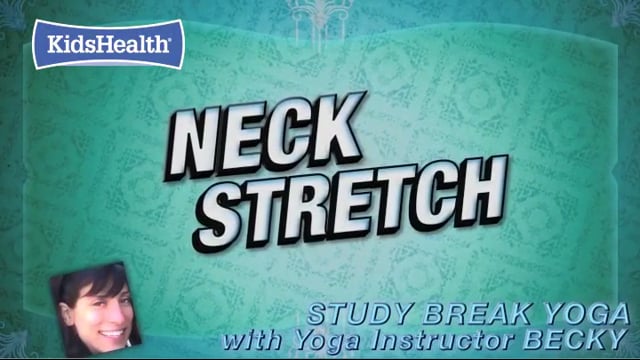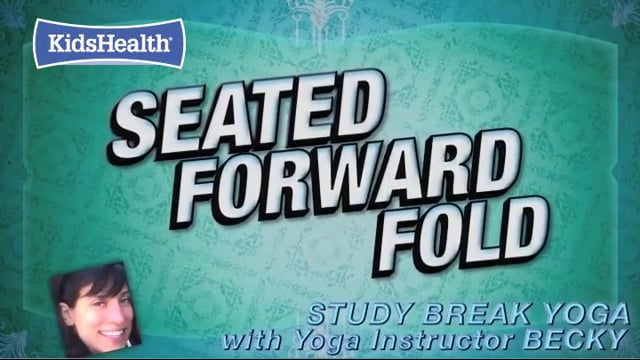- Parents Home
- Para Padres
- A to Z Dictionary
- Allergy Center
- Asthma
- Cancer
- Diabetes
- Diseases & Conditions
- Doctors & Hospitals
- Emotions & Behavior
- First Aid & Safety
- Flu (Influenza)
- Food Allergies
- General Health
- Growth & Development
- Heart Health & Conditions
- Homework Help Center
- Infections
- Newborn Care
- Nutrition & Fitness
- Play & Learn
- Pregnancy Center
- Preventing Premature Birth
- Q&A
- School & Family Life
- Sports Medicine
- Teens Home
- Para Adolescentes
- Asthma
- Be Your Best Self
- Body & Skin Care
- Cancer
- Diabetes
- Diseases & Conditions
- Drugs & Alcohol
- Flu (Influenza)
- Homework Help
- Infections
- Managing Your Weight
- Medical Care 101
- Mental Health
- Nutrition & Fitness
- Q&A
- Safety & First Aid
- School, Jobs, & Friends
- Sexual Health
- Sports Medicine
- Stress & Coping
Yoga for Stress Relief
Why Yoga for Stress Relief?
Life can be stressful. For starters, there's your busy schedule — waking up super early for school, studying late at night for tests, juggling sports practice, homework, and meals. It's a lot to balance!
Everyday issues can add emotional stress, too — counseling a friend through a breakup, regretting a disagreement with a parent, weighing an important decision, or stressing over whether you'll make final cuts for the varsity team. With lots on your mind, it's easy to feel stressed.
There are many different ways to cope with stress. Talking with friends, exercising, and seeing a school counselor are just a few. Yoga can help reduce stress because it promotes relaxation, which is the natural opposite of stress. Yoga can benefit three aspects of ourselves that are often affected by stress: our body, mind, and breathing.
You don't have to wait to feel stressed out to do yoga, and you shouldn't! People who do a little bit of yoga each day often find they're better able to handle things when life gets a little crazy. Practicing yoga builds your ability to calm, focus, balance, and relax yourself.
Yoga Is More Than Just Stretching
Lots of people think of yoga as stretching or twisting the body into various impossible-looking pretzel shapes. But yoga is easier than it looks. There are simple poses as well as complicated ones, so there's something for every ability. Yoga requires no special equipment, so you can do it almost anywhere.
Yoga poses are good exercise and can help loosen up the tense muscles in your body. The areas of the body that tend to carry the most stress are the neck, shoulders, and back. But other parts of the body (like the face, jaw, fingers, or wrists) also can benefit from simple yoga stretches.
Yoga is so much more than just physical exercise, though. The key to getting the best out of each pose is to focus not only on your body, but also on your mind and breathing.
Getting the Most Out of Yoga
When you're in a yoga pose, think about how you can unite your body, mind, and breathing. Even a simple pose like mountain pose is a stress reliever when you focus on keeping your breathing slow and even, and visualize yourself as firm and steady as a mountain.
Stay 'in the moment.' When we're under stress, we're often thinking about what we need to do in the future ("I have to cram for that test") or what we could have done better in the past ("I wish I hadn't said that!"). Instead of letting your thoughts wander as you do yoga, think about what your body and breath are doing in this moment. Notice how a particular muscle or area of the body feels. Focus on breathing in slowly as your body stretches tall, and breathing out slowly as you curl up.
Being in the moment like this helps you build your ability to focus and concentrate, which helps in all aspects of life.
Use your breathing when things get difficult. When a yoga pose feels challenging, imagine sending your breath to the area in your body that feels stiff or tight. Does it help? You can use this skill in the rest of your life, too. Whenever something challenges you — a tough homework problem, an argument with a parent — try to focus on your breathing. You may be surprised by how much better you deal with the situation.
When to Try Yoga
Try taking a weekly yoga class or watching a yoga video to help you learn some yoga poses. There are classes as well as videos created especially for teens.
You can also incorporate mini-bits of yoga into your daily life to help you manage stressful moments. Here are some ideas:
- Before a test. Do easy neck and shoulder rolls right at your desk to relieve tense muscles in your neck, shoulders, and back. Also try squeezing and relaxing your fingers and hands. These exercises can take as little as 30 seconds, and can be repeated as often as you need!
- While studying. Try a few simple yoga moves to help relax any areas that may have become tense while studying. Neck and shoulder rolls can release tension in your back and shoulders. Forward folds and twists will relieve lower back strain. Give your face a mini-massage to help loosen up a tense jaw. Balancing poses, like tree pose, can help focus your energy so you can concentrate on what you need to do!
- Before bed. Do a few yoga stretches before bed to help you relax — especially if you have a lot on your mind. Poses where you fold forward, like child's pose, tend to be calming. They allow you to tune out the rest of the world and feel quiet and peaceful. Stay in a forward fold for 3 or 4 full, slowing breaths, and allow your body and mind to relax.

Belly Breathing

Neck Stretch

Seated Foward Fold
Yoga and YOU
The best part about yoga is that it helps you discover more about your mind, body, and emotions. Yoga can help you become more balanced, calm, focused, and relaxed as you go through life's usual ups and downs.
Of course, you won't instantly feel more positive, calm, or energetic after doing a few yoga poses. As with all good things, the effects of yoga need to build up over time.
But if you give yourself a half hour each day to do a few yoga poses, after a couple of weeks you should start noticing a subtle change. Keep going longer and yoga will become a natural part of your daily routine, ready to help you manage life's stresses well into the future.

© 1995- The Nemours Foundation. KidsHealth® is a registered trademark of The Nemours Foundation. All rights reserved.
Images sourced by The Nemours Foundation and Getty Images.